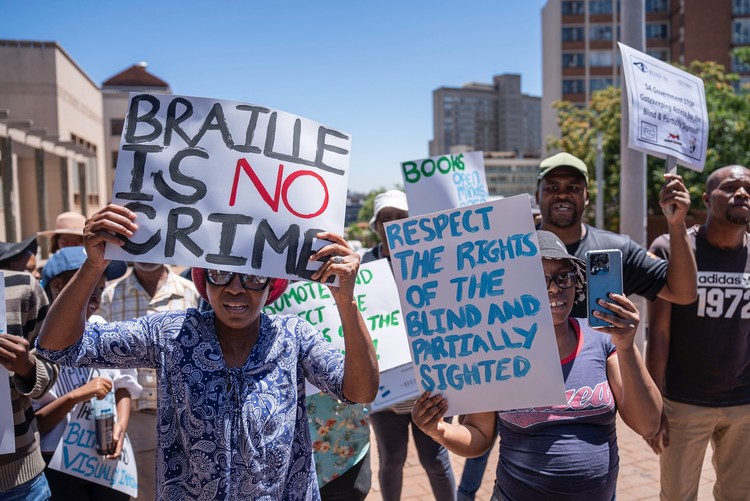
17 November 2025
A protest outside the Constitutional Court in November 2024 when lawyers for Blind SA requested that a court-crafted copyright exception for braille and other accessible formats be extended. Archive photo: Ihsaan Haffejee.
South Africa adopted the Marrakesh Treaty to Facilitate Access to Published Works for Persons Who Are Blind, Visually Impaired, or Otherwise Print Disabled in June 2013, but has yet to ratify it and bring it into law.
The final legal barrier to do so was removed by a landmark Constitutional Court ruling in Blind SA v President of the Republic of South Africa in May this year. Continued inaction is a denial of justice for blind and print-disabled South Africans.
The Marrakesh Treaty, by the World Intellectual Property Organization, had a clear mission: to end the global “book famine” by enabling the production and cross-border exchange of accessible books without requiring permission from copyright holders.
This is vital for blind and print-disabled people, as it provides them with access to education, information, and culture on a global scale.
More than 120 countries have already ratified the treaty, including 30 countries in Africa. South Africa remains conspicuously absent.
For Blind SA, an organisation dedicated to empowering blind and partially sighted people to live full and meaningful lives, the ratification of the Marrakesh Treaty is not just a matter of international compliance. It is a fundamental issue of equality and dignity.
Access to information is central to our work, enabling our members to pursue education, secure employment, and participate fully in society. The continued lack of access to a vast body of published works places blind and print disabled South Africans at a profound disadvantage.
For years, the South African government has cited the absence of a suitable legal framework as its primary reason for not ratifying the Marrakesh Treaty.
But this excuse no longer holds. On 3 October 2023, 10 November 2023, 27 March 2024 and 17 July 2025, Blind SA together with their attorneys SECTION27, wrote to the Department of Trade, Industry and Competition (DTIC), requesting the immediate ratification of the Marrakesh Treaty.
Earlier, on 27 June 2023, SECTION27 and Blind SA, together with other civil society organisations, marched to the offices of the Department of International Relations and Cooperation and delivered a memorandum calling for the initiation of the ratification process and a meeting to discuss the way forward.
Identical memorandums were also delivered to the DTIC, the Department of Women, Youth and Persons with Disabilities, the Department of Justice and Constitutional Development and the Presidency.
On 7 May 2025, Blind SA secured a landmark victory in the Constitutional Court, one that permanently grants blind and partially sighted people an exception to copyright law, granting us the right to convert published works into accessible formats like braille and audio without needing permission from the copyright holders.
Crucially, the wording of this judgment was taken directly from the text of the Marrakesh Treaty. In effect, the Constitutional Court has already done the legislative heavy lifting. The legal framework the government claimed was missing is now enshrined in our highest law.
And yet, more than five months later, there has been no visible action from the government. The inaction can only be interpreted as a disregard for our rights and a lack of respect for the very citizens it is meant to serve.
The time for excuses is over. The government’s continued inaction is indefensible. We demand that the government immediately and without further delay begin the process of acceding to the Marrakesh Treaty.
We further call for a clear and transparent timeline and for consistent engagement with the disability sector throughout this process. Our constitutional rights to dignity, equality, and access to information are not negotiable.
The government must act now, not only to fulfil its legal obligations, but to uphold the values of justice and inclusion. The world is watching.
Views expressed are not necessarily those of GroundUp